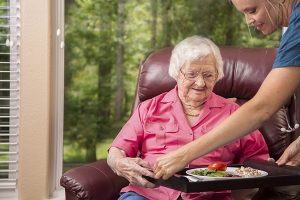
If you’re a family caregiver thinking, “I need help with my elderly mother,” or an adult child saying, “My mother needs home care,” you’ve come to the right place. You want to be there if your elderly parents are unable to care for themselves, but you also have a life with competing responsibilities. We understand, and no one is judging you for needing help with elderly parents at home.
There are plenty of reasons you may not be able to care for your elderly parents:
- You have a full-time job
- You aren’t financially stable
- You live too far away from them
- You don’t have a good relationship with them
- You don’t have the disposition to be a caregiver
The list goes on.
Many adult children find themselves looking for elder care services but don’t know the first thing about them. In this article, we explain what to do when your elderly parent needs care (and who to call).
What to Do If You Have Elderly Parents Unable to Care for Themselves
Several options are available for elderly parents unable to care for themselves, but one size doesn’t fit all when it comes to senior care. For some families, moving in grandma and/or grandpa is a gift. For others, enabling them to live in their own home is a better decision for everyone.
If you’re wondering what to do when your elderly parent needs care, here are four options to consider.
1. Move Your Parents Into Assisted Living
If your parents are generally healthy but don’t want the responsibility of being a homeowner anymore, they may be a good fit for an independent living community. But assisted living is a better option if they require help with daily living but don’t need the level of care provided at a nursing home. Assisted living facilities promote a resident’s independence and create a home-like setting while providing different levels of care. However, the more care your elderly parent requires, the more expensive it is for them to live in these facilities, which can add up quickly.
2. Move Your Parents In With You
According to a national study, family caregivers spend 26% of their income on caregiving activities. It’s a significant commitment to not only care for your aging parents but financially, physically, and emotionally support them in your own home. Sometimes, moving your parent(s) in with you is necessary in light of a crisis or sudden diagnosis. If you can, take time to consider the implications to ensure you’re making an informed decision for yourself, your family, and your parent(s).
3. Keep Your Parents at Home
The University of Michigan’s National Poll on Healthy Aging found that nearly 9 in 10 Americans (88%) between 50 and 80 years old said it’s important to age in place. Your parent likely falls within that 88%. Home care is a wonderful way to keep your parents in a familiar setting while getting them the care they need – without you being their caregiver.
Varying levels of care are available for aging adults depending on their needs:
- Memory care
- Overnight care
- Live-in care
- Personal care
- Companion care
- Respite care
There’s even specialty home care designed to help those with unique needs or health conditions. If you’re interested in exploring in-home care services for an aging loved one, we recommend TheKey: a home care agency that provides exceptional care to older adults.
4. Contact a Geriatric Care Manager
Geriatric care managers have many different titles: geriatric care consultants, elder care specialists, senior care advisors, etc. At the end of the day, they guide families through elder care so that adult children can better understand the options available for their aging parents.
Some geriatric care management services include:
- Consulting with family members
- Presenting care options
- Coordinating senior care
- Assisting with housing and relocation
- Guiding decision-making
- Creating short- and long-term care plans
Relying on the experience of geriatric care managers instead of fumbling through senior care alone could save you time, money, and headaches down the road. A geriatric care manager’s goal is to help relieve the burden of care that adult children often carry and improve seniors’ quality of life.
Get Help With Elderly Parents At Home Today
“How do I get help for my elderly parents?” Get in touch with a home care agency like Stowell Associates that can support you and your family with elder care services.
Whether you’ve been looking after a loved one for a while and recently thought, “I need help with my elderly mother,” or your parents suddenly need help and you can’t be their caregiver, call us at 414-488-6491. At Stowell Associates, we have a team of expert geriatric care managers ready to advise you on the next best step regarding your parents’ care.
Do you have elderly parents unable to care for themselves? Contact Stowell Associates to learn more about how our care team can support your family.












